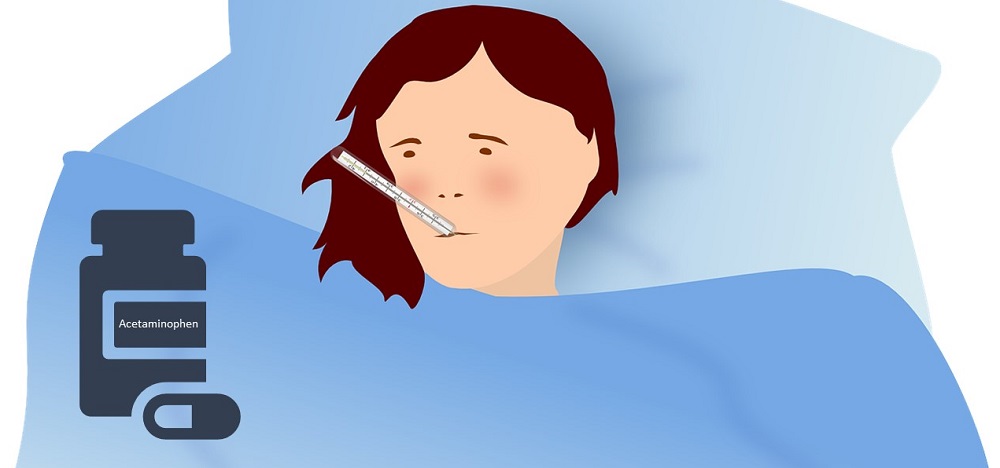Fever is a symptom of many infectious diseases. It is a natural response of the body to infection and is designed to reduce infection. Indeed, the immune system produces proteins called pyrogens that reset body temperature at higher than normal to help fight infection. Fevers can be dangerous, resulting in convulsions and brain damage if the temperature is too high. Most people take a fever-reducing pain reliever, such as Tylenol (also known as acetaminophen or paracetamol) or a non-steroidal anti-inflammatory drug (NSAID). Motrin and Advil, which contain ibuprofen, and aspirin, are the most commonly used NSAIDs. Another is naproxen, which is in Aleve. All of these will reduce fever, however, acetaminophen does not have the same anti-inflammatory properties that NSAIDs do.
Both types of fever-reducing medicines have the potential for side effects, but both are safe when used at the recommended dosages. NSAIDs inhibit enzymes that produce factors critical for blood clotting, so these medications are not recommended for people taking anti-clotting medication or at risk for bleeding, such as people with ulcerative colitis or stomach ulcers. NSAIDs are associated with kidney toxicity, whereas acetaminophen is liver toxic when taken in excess. So recommended doses should not be exceeded. Acetaminophen or NSAIDs are present in many different common cold, cough, and sinus medications. Read the labels carefully before taking either acetaminophen or an NSAID in addition to a cold, cough, or sinus medication to ensure that the medication does not already contain one of these.
What does this mean for people who get COVID-19 or another infectious disease that causes fever and discomfort? Try to tolerate the fever, at least for a while. This gives your body a chance to use fever as a defense against the infecting virus or bacteria. Monitor your temperature. In adults, a temperature above 103 F (39.4 C) is considered too high. In infants, any temperature should be reported to a medical care professional. In children, several factors should be considered, including temperature, responsiveness, and duration of fever.
Fever is a hallmark symptom of COVID-19. If you have a dry cough, shortness of breath or difficulty breathing, and a fever, these are the common symptoms of COVID-19. Remember for most people COVID-19 is not dangerous or life-threatening. Some will require respiratory support and hospital care. If you are not sure, contact your healthcare provider or hospital and explain your symptoms and follow their guidance.
Regarding if it is safe to take ibuprofen or an NSAID to reduce fever if you think or know you have COVID-19, as of 18 March, there is no clear scientific basis from analyzing data from patients with COVID-19 for choosing an NSAID or acetaminophen as a fever reducer. However, NSAIDs and the virus that causes COVID-19 both affect the kidney function through the renin-angiotensin system. So, acetaminophen could be a safer option for treating fever associated with COVID-19, especially in older patients who are more likely to have compromised kidney function already.
Related Resources
Fever. Mayo Clinic. https://www.mayoclinic.org/diseases-conditions/fever/symptoms-causes/syc-20352759 (accessed 18 March 2020).
Ungprasert P, Cheungpasitporn W, Crowson CS, Matteson EL. Individual non-steroidal anti-inflammatory drugs and risk of acute kidney injury: A systematic review and meta-analysis of observational studies. Eur. J. Intern. Med. 26, 285–291 (2015). DOI:10.1016/j.ejim.2015.03.008
Hörl WH. Nonsteroidal Anti-Inflammatory Drugs and the Kidney. Pharmaceuticals (Basel) 3, 2291–2321 (2010). DOI:10.3390/ph3072291
Kuba K, Imai Y, Ohto-Nakanishi T, Penninger JM. Trilogy of ACE2: a peptidase in the renin-angiotensin system, a SARS receptor, and a partner for amino acid transporters. Pharmacol. Ther. 128, 119–128 (2010). DOI:10.1016/j.pharmthera.2010.06.003
Melville NA, Nainggolan L, Are warnings against NSAIDs in COVID-19 warranted? Medscape Medical News (17 March 2020) https://www.medscape.com/viewarticle/926940 (accessed 18 March 2020)
Coronavirus (COVID-19). Centers for Disease Control and Prevention. https://www.cdc.gov/coronavirus/2019-ncov/index.html (accessed 18 March 2020)
Cover details
Cite as: N. R. Gough, Treating Fever in Case of COVID-19 Infection. BioSerendipity (18 March 2020) https://www.bioserendipity.com/treating-fever-in-case-of-covid-19-infection/

